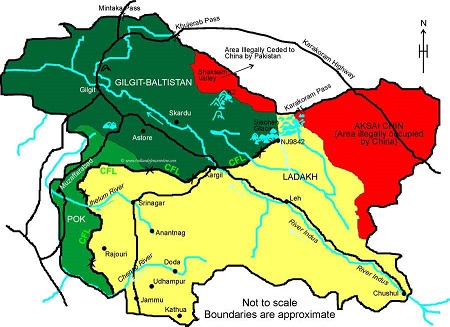Why in news?
Pakistani government was considering making Gilgit-Baltistan (GB) the fifth province of Pakistan.
What is the importance of GB?

- GB is one of the two parts of Pakistan Occupied Kashmir (PoK).
- The other one is “Azad Jammu and Kashmir” (AJK) and both formed part of the territory of the erstwhile princely state of Jammu and Kashmir (J&K).
- The territory was handed over to the newly created state of Pakistan in November 1947 by the action of a British officer of the Gilgit Scouts.
- Despite being in the service of the Maharaja of Kashmir, he revolted and joined Pakistan.
- GB has an area of 72,000 sq. km and comprises about 85% of the total area of PoK.
- It is a strategic location i.e. provides land access to China, contains vast reservoirs of fresh water and the China-Pakistan Economic Corridor (CPEC) passes through it.
- Despite this, GB does not form part of the territory of Pakistan.
What is the current move?
- The administrative units of Pakistan consist of four provinces, one federal capital territory, and two autonomous and disputed territories.
- The four provinces of Pakistan are Khyber Pakhtunkhwa Province (KPK), Punjab, Sindh and Balochistan.
- The tribal belt adjoining KPK is managed by the Federal Government and is named FATA i.e., Federally Administered Tribal Areas.
- Currently Pakistani government is planning to make Gilgit-Baltistan (GB) the fifth province of Pakistan.
What is its significance?
- There are many impediments in the way of making GB the fifth province of Pakistan.
- Previously, when every time such a proposal was made, the conclusion has been that GB is part of J&K and any such move would seriously damage Pakistan’s Kashmir case.
- Two UN resolutions of 1948 and 1949 clearly established a link between GB and the Kashmir issue. It mentioned that “pending a final solution, territory evacuated by the Pakistan troops will be administered by the ‘local authorities’.
- Making GB its fifth province would thus violate these UN resolutions that would damage its position on the Kashmir issue.
- That would also be violative of the 1963 Pak-China Boundary Agreement that calls for the sovereign authority to reopen negotiations with China after the settlement of the Kashmir dispute between Pakistan and India.
- It is also violative of the 1972 Shimla Agreement that mentions that “neither side shall unilaterally alter the situation”.
- Pakistan would also have to overcome the adverse reaction of Kashmiris on both sides of the LoC.
What is the reason behind the Pakistan raising the issue?
- With a $50 billion investment in the CPEC, China would hardly does not want the CPEC route on a disputed territory.
- Pakistan has raised the controversy to tell the Chinese how difficult it is to make GB its fifth province and how this would compromise its long-standing position on the Kashmir issue.
- Thus the issue has been raised to appease China and distract India.
Source: The Indian Express
